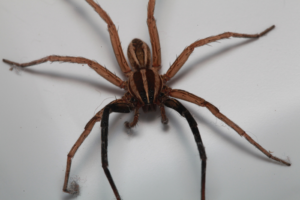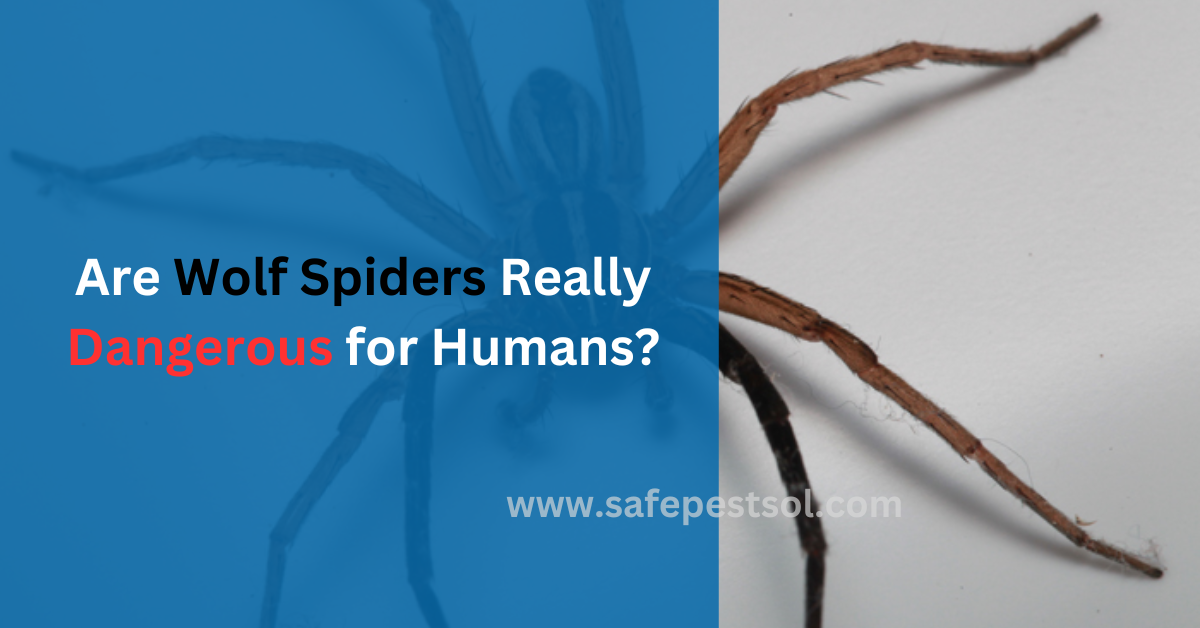Are Wolf Spiders Dangerous?
Are wolf spiders harmful? This is a question that many people have when they discover these ground-dwelling, fast-moving arachnids inside their houses. Most of us consider these spiders dangerous-looking because they look so scary. So yes, they do scare, but they also help control the pest population inside your house.
Read this blog to learn more about wolf spiders. You can find out what to do upon seeing these creatures in your homes.

What Are Wolf Spiders?
Wolf spiders are species belonging to the extensive Lycosidae family. This family is mainly known for its great hunting skills and ability to adapt to most kinds of environments.
Unlike most spider species that trap their prey using webs, wolf spiders are active hunters that hunt for their insect prey, mainly found on the ground, with agility and the help of keen eyesight.
Their eight large eyes are arranged in three rows and serve to give a bright view. These spiders are solitary hunters who can be found in fields, forests, or even urbanized areas to prey on insects to sustain their populations.
Understanding the Mechanism of Wolf Spiders
Wolf spiders have structural and behavioral adaptations that help them become great predators. Their large size and quick movements helps them in chasing down prey. Moreover, their ability to camouflage their body helps them blend into their surroundings.
The adult female wolf spider is easily identifiable by the egg sac beneath its abdomen. After hatching, the spider lings cling to their mother’s back for several days to increase their survival chances.
Are Wolf Spiders Dangerous?
No, Wolf spiders do not pose a danger to humans most of the time. Due to their big size and their fast speed, they might look scary. But usually, they don’t pose any harm to humans when they interact.
In any case, if a wolf spider bites, it may cause minor discomfort. Nonetheless, people with allergic reactions to spider bites may feel severe symptoms, which might need medical attention on an immediate basis.
Life Cycle of Wolf Spiders
| Life Stage | Description |
| Egg Stage | Eggs are laid in a protective egg sac carried by the female. |
| Spiderlings | Hatchlings cling to their mother’s back for safety during their early days. |
| Juvenile Stage | Young spiders grow independently, shedding their exoskeleton as they mature. |
| Adult Stage | Fully grown wolf spiders actively hunt and reproduce. |
What do Wolf SpidersLookk Like?
Wolf spiders are easily noticeable because of their large sizes, hairy bodies, and specific eye distribution. They usually differ in color, like gray-brown, and the presence of markings makes them hide within their habits. Moreover, their long legs and activities make them different from all spider species.
Symptoms of Wolf Spider Bites
1. Redness and Swelling at the Bite Area
Localized redness and swelling around the bite area are the most common clinical signs of wild spider bites. These are the typical side effects of spider bites on the human body. Although this spider venom is very effective for pests, it doesn’t affect humans severely. This swelling may last from several hours to a few days.
2. Mild to Moderate Pain or Itching
It may cause light to moderate pain or an itching feeling. Though the feeling is mostly a little discomfort, it usually fades away after a couple of days. A cold compress can be very effective in relieving pain and itching.
3. Occasional Allergic Reactions
Only very few people suffer allergic reactions to wolf spider bites. Some symptoms include hives, difficulty breathing, and other severe reactions. Such conditions require an immediate visit to a doctor.
4. Minor Skin Irritation or a Small Lump
The area where the wolf spider bites may develop a small lump or minor irritation. This usually causes no problems and is cured on its own. Keeping the area clean will help prevent infection and ensure speedy recovery.
Where Do Wolf Spiders Live?
Wolf spiders are tolerant to a variety of habitats. They can live in forests, grasslands, urban surroundings, and even basements. They prefer ground-level areas such as leaf litter, rocks, or a burrow.
Most of the time, wolf spiders can hide in homes within the basements, garages, and other areas where no one disturbs them. With all these options, the wolf spider is considered one of the most widely spread spider species worldwide.
What to Do If a Wolf Spider Bites You
Clean the Bite
Gently wash the biter under running clean water mixed with soap. This can help remove any possible bacteria and lessen the chance of infection. After this, you have to dry the bitten area with a clean towel.
Apply a Cold Compress
Put an ice pack or cold compress covered with a cloth on bitten areas. It may soothe pain and lessen swelling when needed. Repeat this proceed in every 10-15 minutes.
Seek Medical Attention
If the bite causes extreme symptoms such as severe pain, breathing difficulties, or reactions, it can be a sign of allergic reaction. In such case, seek a medical attention immediately.
Ways to Get Rid of Wolf Spiders
Declutter Your Home
Maintain your home, and keep it clean and clutter-free. Dispose piles of clothing, boxes, and other stuff that may attract spiders. It really reduces the chances of wolf spiders finding hiding spots for themselves.
Seal Cracks and Gaps
Inspect the walls, windows, and doors to find out cracks or gaps. Seal these entry points to keep the wolf spiders and any other pests out.
Use Natural Repellents
Use essential oils for spiders bites and to repel pests such as peppermint or vinegar. Spray it within areas where spiders tend to hide.
Maintain Cleanliness
Regular cleaning and vacuuming at home, particularly at dark corners and crevices. By doing this, you can prevent excessive spider population by destroying their habitat.
Conclusion
Are wolf spiders dangerous? On first look, they do look scary. However, these intriguing spiders present no danger to human. In fact, they contribute importantly in controlling pests. Understanding their habits and following basic precautions will easily help share your space with these wonderful arachnids.
FAQs
Are wolf spiders dangerous to pets?
No, Wolf spiders are not harmful to pets at all. Their bites are rarely dangerous. But in some cases, it is always better to consult a veterinarian if you notice any unusual symptoms in your pet.
How can I identify a wolf spider bite?
A wolf spider bite typically appears as a red, swollen area that may itch or hurt slightly. Severe symptoms are rare.
Can wolf spiders infest homes?
Wolf spiders can sometimes come indoors, but they do not infest like other household pests. They often live alone and are relatively easy to manage with the right precautions.
Want To Eliminate Spiders From Your House? Call Us!
If you don’t know what to do with spiders crawling all over your house, give our experts a chance. Just connect with us and let Safe Pest Sol help you get rid of any spider species from your house.

